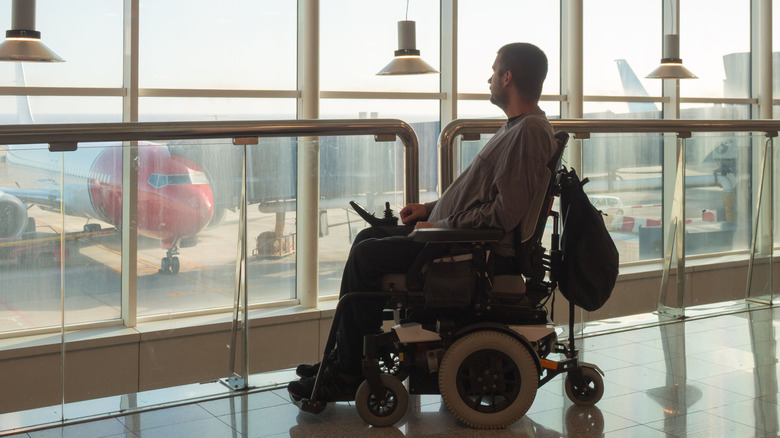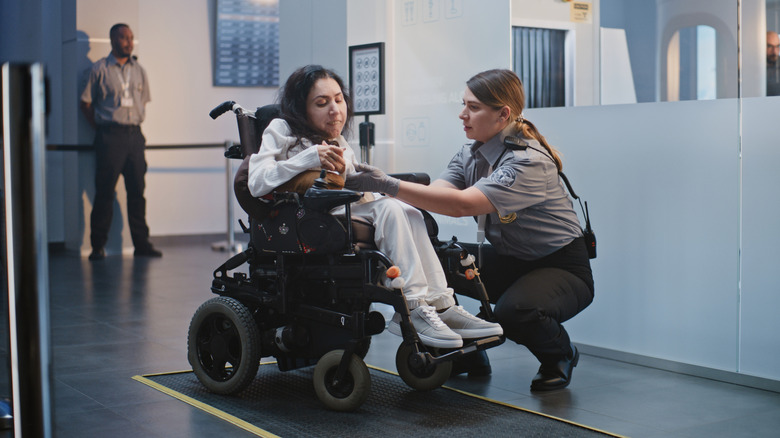What To Do If An Airline Won't Accommodate Your Disability
From navigating TSA with your service animal to figuring out who to ask for a wheelchair through the airport, there are a lot of moving parts to work out — but that shouldn't include the airline you're flying with refusing to accommodate your disability. Airlines typically have their own policies about accessible travel that lay out what services they provide to passengers who need them, but they aren't just bound by company policy. Airlines cannot discriminate against disabled travelers — it's the law. Before you set out on your trip, know your rights. If your rights are being violated, speak up. Make a complaint to the appropriate authorities and escalate if you have to.
The Air Carrier Access Act (ACAA) applies to any airline flying into or out of the United States. It not only makes it illegal for airlines to discriminate against passengers with disabilities, but it also guarantees that they will provide some kinds of accommodations. That includes offering passengers help getting on and off the plane and providing seats that suit their needs (for instance, more leg room for a passenger with a brace). If you need it, the gate agent should give you extra time to board. Sometimes, accommodations also extend to the things, people, and animals who help you to live your life. If you have a necessary medical device, you can't be charged extra for it. If you have a service dog, even one that you trained yourself, you are allowed to bring it. If you are traveling with someone who assists you (for instance, a sign language interpreter), they are typically allowed to sit next to you.
How to push for your rights at the airport
Whether you're trying to plan your dream vacation with mobility issues or are on the autism spectrum and are trying to navigate air travel, there are a lot of factors to consider when traveling with a disability. Unfortunately, planning ahead in case you don't get the accommodations that you're entitled to is also a good idea. While you legally do not have to let airlines know in advance to get your accommodations unless you're bringing a wheelchair that has certain types of batteries or need to be connected to the airplane's oxygen, airlines often request this information when you buy your tickets, and many passengers give them a heads up to make everything go smoothly. Airline employees are required to have regular training about safely assisting passengers with disabilities, but unfortunately, things do sometimes go wrong. If they do, don't be afraid to speak up and push for your rights.
If airline staff deny you accommodations that you're legally entitled to or, worse, refuse to let you on the plane, your first course of action should be to ask to speak to a Complaints Resolution Officer (CRO). They should have more up-to-date training on accommodations and are more likely to understand the airline's obligations to passengers with disabilities. If they still won't accommodate you, you may want to contact the U.S. Department of Transportation's hotline (1-800-778-4838) to confirm your rights and get help.
What to do if you were denied accommodations by your airline
If you were unable to get the accommodations that you're legally entitled to from the airline, you should file official complaints. You can go to the website of the airline that you booked with to see how to file a complaint with the airline itself. The Department of Transportation requires companies to respond. You should also reach out to the Department of Transportation directly, either online or by mail, with the details of what happened. While they won't directly help you resolve the issue with the airline, reports from passengers with disabilities are vital for tracking trends with different airlines.
Discrimination against people with disabilities is a crime, so if your rights were violated, you can also take the airline to small claims court. While it can't undo what happened, it can help you get back any money that the airline cost you by denying your accommodations. That doesn't just mean the price of your ticket. For instance, if an airline didn't provide you with the accommodations to fly home on your original flight and you were stuck at your destination for another night, you could insist that they pay the extra expense for your hotel stay. If you can't resolve the problem with the airline, try contacting your local clerk of court's office and ask for information on how to move forward. You don't necessarily need a lawyer for this kind of suit, so all you'll need to pay is the filing fee.


